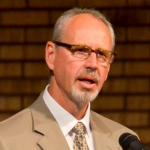
Rob Staley founded his private school a decade ago, with eight students he expelled himself from public school. The former public school principal wanted the “toughest of the toughest” – the gangbangers, the dropouts, the pregnant. He wanted to give them another chance at education – and life – with a school that combines faith-based therapy, career training and a never-give-up attitude.
The result? The Crossing, based in Elkhart, Ind., has now enrolled more than 6,000 students since its founding. It operates on 15 campuses and partners with 35 public school districts across Indiana. It’s yet another example of the kinds of schools that are possible when the artificial lines between public and private education fade away, and the focus instead is put on creating options that better meet kids’ needs.
“I believe in public schools … they are run by good people,” Staley said in a phone interview with redefinED. “But the truth is, public schools can’t serve every student.”
The state-accredited religious school focuses on helping “students begin and continue their journey with God.” Its mission: to save students, not merely in a spiritual sense, but from a life of poverty or crime. Its focus: academics, job training and mentoring.
Staley worked in Indiana public schools for 25 years. He saw the extraordinary efforts teachers and principals make to encourage students to succeed – and how sometimes they still fell short.

Many students sent to The Crossing failed to succeed in district-run alternative schools. After founding his first campus in Goshen in 2003, Staley turned to his friends in the local district and asked them to send the kids that had dropped out or been expelled.
Staley raised private funds to educate these students but the need outstripped public generosity. Within a few years, he had convinced public schools in Elkhart, then Middlebury and South Bend, to support his school with public tax dollars. Although these districts operated their own alternative schools, they were encouraged by Staley’s willingness to try something different.
In South Bend, about half of the eligible seniors at The Crossing campus graduated with a high school diploma last year. “Those were 19 graduates that won’t be counted as dropouts,” Staley said.
Since the school doesn’t have a traditional freshman cohort – students typically arrive as juniors or seniors – the school cannot calculate a graduation rate that allows for comparison with district-run schools. Staley says his schools have an 87 percent retention rate.
(Update: A representative of The Crossings says Amanda – in the featured video above – is now attending Ross Medical Education Center)
Being a faith-based school that accepts public dollars is not without controversy.
In September, the South Bend Local School Corporation (the local district) narrowly approved renewing its contract with The Crossing. One school board member said he was against “outsourcing education,” especially when he thought it violated separation of church and state. Another disagreed, citing the district’s partnerships with private religious organizations like the University of Notre Dame and YMCA.
Staley said lawyers in every contracted district make sure the program is constitutional. He said its curriculum is the same as the one taught in Indiana public schools. It includes the teaching of evolution.
But it makes no bones about its faith-based components.

Halfway through the day, students are given a 30-minute break. They sit in couches and lounge chairs in a break room paid for by private donations, speaking with a “faith-mentor” about their lives and families and struggles. The faith-mentor, whose salary is paid for by private donations, provides biblical answers.
The faith mentoring is not required to attend the school. Students can opt out.
With private school vouchers now available in Indiana, Staley’s extraordinary efforts to operate a faith-based school with secular-based instruction may now be irrelevant. But it certainly shows his commitment to trying something different within the public school framework. For all we know, the secular instruction mixed with faith-based mentoring works for these kids.
About 80 percent of them are approved transfers from public schools. But Staley also partners with charter schools, accepts vouchers and enrolls students who voluntarily seek his help. For the kids who enroll themselves, The Crossing charges $10 a month and seeks outside donations to pay for the remainder of the student’s educational costs.
The faith-based components aren’t the only things that make the school distinctive. Students are able to get on-the-job training and even learn entrepreneurial skills for three hours a day.

“Our students run real businesses,” Staley says. Some run a tree trimming service; some operate a lumber yard; others rebuild cars in an auto shop. The Crossing also has a working 145-acre farm that doubles as a residence for the school’s homeless students.
The school is not without its struggles. Teachers often find it difficult to teach an exclusively at-risk population. They average three years. The school doesn’t graduate every student with a high school diploma, and it doesn’t save every student from a life of crime or an early grave. “We’ve buried 13 of our students since we started,” Staley said.
After the controversy in South Bend, the school and district agreed on a new contract that will allow The Crossing to serve 100 dropouts. The district will pay The Crossing $5,500 for each student it educates.
Staley is happy to have the contract renewed, but is confused by the 100 student limit. If there are more than 100 dropouts, he wants the chance to educate them.
Some high-needs school districts, though, are even less cooperative, and still refuse to partner with The Crossing. Those districts “always say they already have an alternative school,” Staley says.
“But do you still have dropouts?” he always asks.


